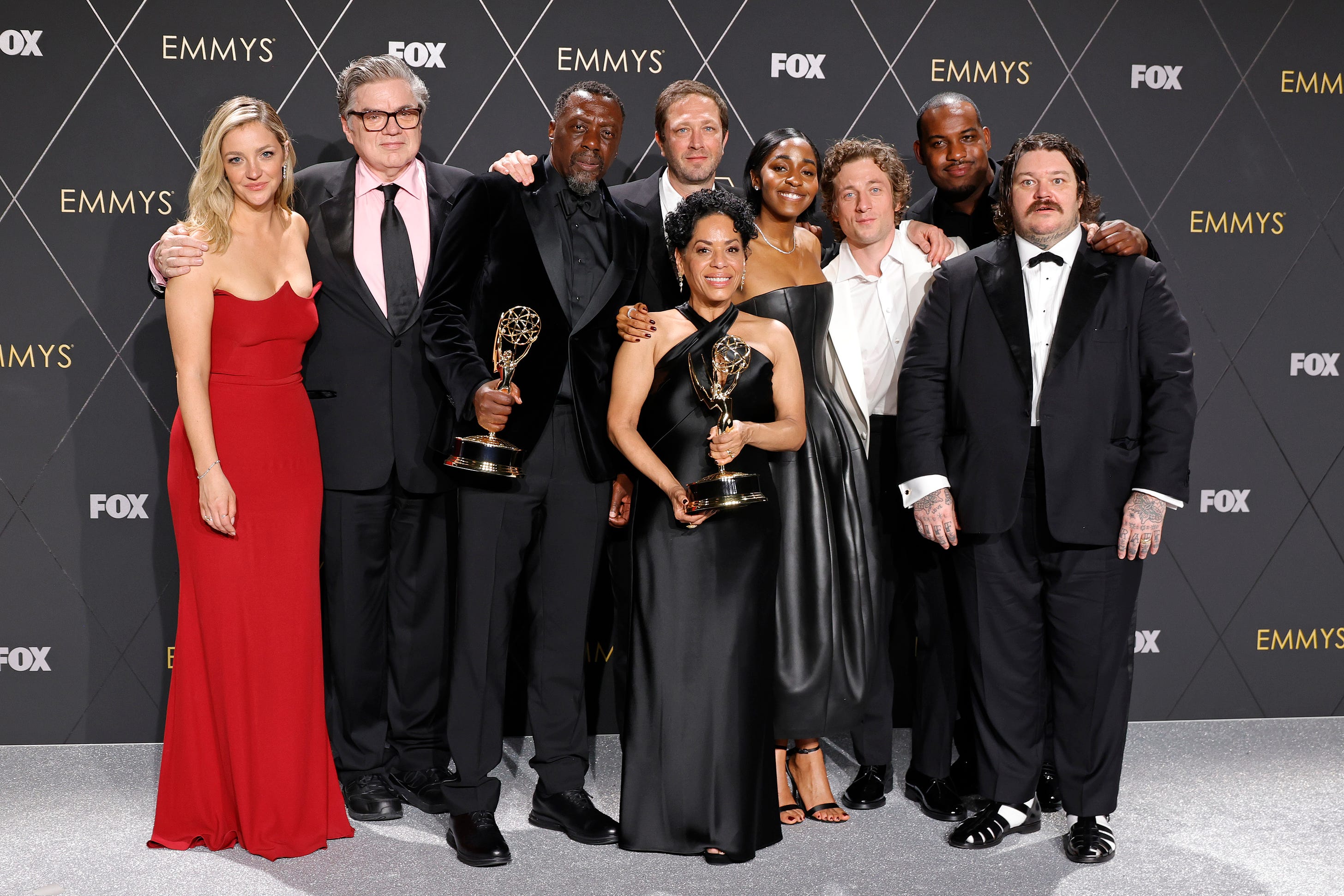|
 |
Are You Laughing Yet?
In this week’s Editor’s Corner, guest contributor Kate De Lanoy looks at recent trends in television comedy shows and wonders why they’ve gotten so serious
For me, January has always signaled two things: the start of the NFL playoffs and the kickoff of awards season. And thanks to last year’s writers’ and actors’ strikes, the Emmys moved from their regular September slot to MLK day, adding another red-carpet event to an already glam month.
When the nominations were announced, I was pleased to see so many of my favorite shows and actors recognized. But looking over the nominees for Outstanding Comedy, I was struck by the heaviness of nearly every show in the category.
Comedy, particularly those historically celebrated by the Emmys, have long served as an entry point for conversations about tough societal issues. But while previous years might include one or two shows that use satire or absurdism to speak to social issues, this year’s nominees almost universally focused on stories usually left to the drama category.
Themes of this year’s comedy nominees include:
· Murder, both solving and committing (“Barry,” “Only Murders in the Building,” “Wednesday”)
· Generational Trauma (“Barry,” “The Bear,” “The Marvelous Mrs. Maisel,” “Ted Lasso”)
· Addiction (“Barry,” “The Bear”)
· Bigotry (“The Marvelous Mrs. Maisel,” “Ted Lasso”)
· PTSD (“Barry,” “The Bear,” “Ted Lasso,” “Wednesday”)
· Aging and Loneliness (“The Bear,” “The Marvelous Mrs. Maisel,” “Only Murders in the Building”)
Are you laughing yet?
Another 2023 nominee, “Abbott Elementary” is perhaps the most traditional comedy of the bunch. It’s a 30-minute, workplace sitcom that airs 22-episode seasons on network TV. But here too, we’re confronted with hard realities. That’s because the workplace in the show is an under-resourced elementary school in Philadelphia, which allows the very real problems with the United States’ educational system to seep into every episode. Standard sitcom hijinks and misunderstandings have the potential to leave first graders in a school without power or working toilets. While the characters are almost always able to use their ingenuity and pluck to save the day, it’s difficult to laugh too hard at these made-up scenarios while aware of the reality that our country’s education infrastructure is actually crumbling.
When did we change our definition (or expectations) for television comedies? Are last year’s nominees so dark because we’ve just come to accept that life is nasty, brutish and short and that that harsh reality will and should touch everything, including comedy? To put it another way, are the sitcoms that were once the golden standard of television comedy, from “The Honeymooners” to “Seinfeld,” simply too frivolous for our times? Maybe we feel that we don’t deserve to laugh just for the fun of it anymore? I don’t think so. The 1960s were an incredibly volatile period in our history and the nominees and winners from that decade suggest that people craved an escape. If you want to use the best comedy Emmy to recognize the shows offering the best societal commentary, you don’t award it to “The Monkees”—which won two Emmys, including Outstanding Comedy Series, in 1967.
I think TV shows have become more complex because the way we’re engaging with them has changed. Most series release several episodes, if not whole seasons, at one time so there’s less need to spend screentime reminding viewers of key plot points and past characters. Even before the pandemic forced us inside and limited our opportunities to socialize, Americans were spending more time alone, meaning that television no longer needs to serve as fodder for tomorrow’s watercooler discussion. Rather, for many, television shows have become our watercooler, the place we turn for quick hits of drama, jokes and affirmations of our feelings and opinions.
The silver lining is that even if we’re drawn to these shows because of the validation they provide, they still offer us a framework to help us understand others’ experiences and, in some cases, even offer an unexpected point of connection with others.
One of the most powerful episodes of television last year was “Fishes” from the show “The Bear.” No summary can capture the episode’s brutally realistic portrayal of loving and living with family members suffering from addiction and depression. The tension in the dining room as the characters gather to celebrate Christmas is on par with the most heart-pounding episodes of the post-9/11 thriller “24.”
I have been at that meal. I’ve sat at that dining room table, unsure of where to look or what to say. And what I realized from the commentaries and reactions to that episode is that a lot of people have been there too. That so many people had firsthand experience with alcoholism and addiction didn’t surprise me; what did surprise me however was how universally this particular portrayal resonated with viewers. One person even told me that it made him nostalgic for his childhood Christmas celebrations.
The connection people felt with that episode and with those characters wasn’t due to some shared political ideology, income bracket or educational degree. We connected with the pain, the fear and the catharsis that comes from surviving one more family gathering. TV shows like “The Bear” (which won this year’s Emmy for Outstanding Comedy Series) and this year’s other nominees serve as an important reminder that despite so many surface-level differences, there’s even more that we share in our emotions and experiences. The best of entertainment, no matter the medium, is able to evoke that. Indeed, to the extent that I’m making a resolution for 2024 and the 10+ months of political campaigning ahead, it’s to keep those shared human experiences in mind.
Were this year’s Outstanding Comedy nominees truly the funniest shows of the year? Maybe not, but they do a pretty good job of offering some laughs along with the opportunity for some introspection. There’s a place for the shows that are easy to watch, the ones that let us block out the world. But humor can offer incredible insight into the world and the people we share it with. And I think we’d do ourselves a disservice if we demand that “comedy” be synonymous with “comfortable.”
What I’m watching: You guessed it, award shows and football playoffs! I absolutely love award shows. There is just something joyful about seeing people celebrated for their achievements and the gratitude they feel for that recognition. And because my beloved Bengals didn’t make the playoffs this year, I am choosing to appreciate the opportunity for stress-free football viewing experience by watching as many post-season games as I can.
For those who prefer comedies with more laughs than angst, I recommend “Jury Duty,” this year’s eighth nominee for Outstanding Comedy. The eight-episode series turns a civic obligation into something like “The Truman Show,” following one unsuspecting person during his time as a juror for a trial that’s completely fake. There are so many reasons this concept shouldn’t have worked, but luckily for us, it did. The result is both fun, funny and surprisingly sincere.
What I’m reading: “The Art of Gathering” by Priya Parker. Building communities of people who share our interest in market-based ideas is a big focus in the year ahead for Mercatus Center, where I work. So, I picked this up Parker’s book to learn more about what goes into creating successful events. So far, my favorite piece of advice is “Don’t Be a Chill Host” with the author suggesting, “Often, chill is you caring about you masquerading as you caring about them.” Overall, I appreciate the case she makes for the importance of intentionality in all aspects of gathering, because without it, you risk wasting a lot of time and emotional capital.
Thanks for letting me crash Editor’s Corner this week. And if you ever want to learn more about what else we’re working on at Mercatus, or if you just want to share your TV takes, you can reach me at [email protected].
Latest Stories
Martin Gurri and David Gurri, "The Fifth Wave: 'Open the Pod Bay Doors, ChatGPT'"
David Masci, "A Biden-Trump Rematch Is No Reason To Panic"
Kenneth Rapoza, "You Don't Own a Chinese Car Yet, But You Will" (for Friday)
Alex Small, "The Ugly Reality of Wartime Speech"
Addison del Mastro, "Canadian Wine Country"
From the Archives
Seth Moskowitz, "The GOP Establishment Is Also at Fault for This Year's Lousy Slate of Republican Candidates"
Robert Tracinski, "The Only Liberal Answer on Schools Is Choice"
Daniel Griswold, "Two Incremental Step Toward Fixing Our Broken Immigration System"
You’re currently a free subscriber to Discourse .

